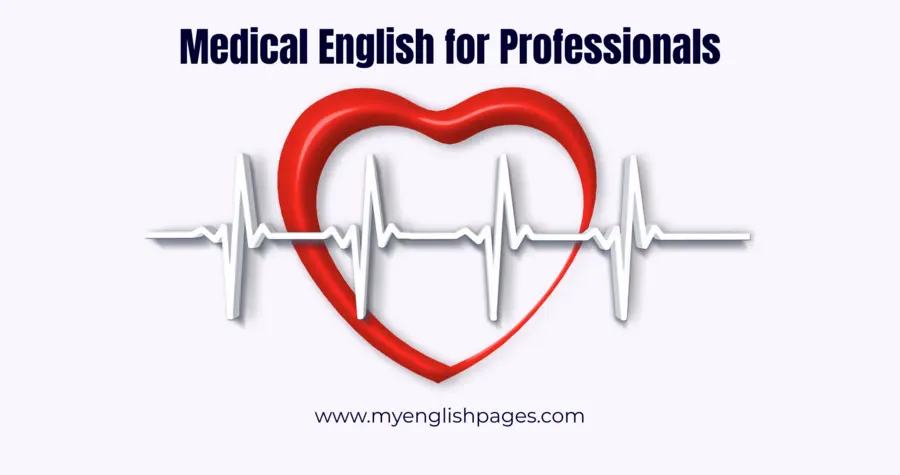Table of Contents
Clear and professional communication is vital in healthcare. For medical professionals who use English at work, knowing the appropriate medical phrases and expressions can enhance patient care, prevent misunderstandings, and foster trust.
In this post, you’ll learn common medical phrases in English, useful expressions used by doctors, and realistic doctor–patient conversation examples.
This is a valuable resource for ESL learners studying English for medical professionals, especially those focused on speaking skills.
Why Learn Medical Phrases in English?

Doctors and nurses working in English-speaking environments often need to:
- Take a patient’s history
- Explain a diagnosis or treatment
- Give instructions clearly and politely
- Offer reassurance or express concern
- Communicate with other medical staff
Learning set phrases helps you speak more naturally and confidently with patients and colleagues.
Common Medical Phrases by Situation
Here are some common medical phrases:
1. Greeting and Starting the Conversation
| Phrase | Use |
|---|---|
| “Good morning. How can I help you today?” | Welcoming the patient |
| “What brings you in today?” | Asking about the reason for the visit |
| “Have you had any recent health issues?” | Beginning the medical history |
2. Asking About Symptoms
| Phrase | Use |
|---|---|
| “Where exactly does it hurt?” | Locating pain |
| “On a scale of 1 to 10, how bad is the pain?” | Assessing severity |
| “Have you experienced this before?” | Understanding history |
| “Do you have any other symptoms?” | Exploring related issues |
3. Explaining Diagnosis and Tests
| Phrase | Use |
|---|---|
| “I believe you may have a mild infection.” | Sharing a possible diagnosis |
| “We need to run a few tests to be sure.” | Preparing the patient |
| “Your blood pressure is slightly high.” | Giving test results |
| “I’ll refer you to a specialist.” | Making a referral |
4. Giving Instructions and Treatment
| Phrase | Use |
|---|---|
| “Take one tablet twice a day, after meals.” | Prescribing medication |
| “You should rest and stay hydrated.” | Giving general advice |
| “Please avoid lifting heavy objects.” | Offering recovery instructions |
| “Come back for a follow-up in two weeks.” | Scheduling the next visit |
5. Offering Reassurance and Empathy
| Phrase | Use |
|---|---|
| “You’re in good hands.” | Reassuring the patient |
| “We’ll take care of you.” | Building trust |
| “I understand this may be stressful.” | Showing empathy |
| “Try not to worry — this is treatable.” | Reducing anxiety |
6. Describing Patients Professionally
| Word / Phrase | Example |
|---|---|
| “The patient is stable.” | General condition |
| “She is responding well to treatment.” | Progress update |
| “He has a history of hypertension.” | Medical history |
| “She appears to be in mild distress.” | Observation |
| “The patient is conscious and alert.” | Status update |
Sample Doctor–Patient Conversations
Below are examples of common doctor–patient conversations in English. Practicing these dialogues can help you become more fluent and confident when speaking in medical settings, whether you’re giving instructions, asking about symptoms, or reassuring a patient.
🔊 Conversation 1: General Check-up
- Doctor: Good morning. What brings you in today?
- Patient: I’ve been feeling very tired lately.
- Doctor: How long have you been feeling this way?
- Patient: About two weeks.
- Doctor: Have you been sleeping well? Any changes in your appetite?
- Patient: I’ve had trouble sleeping, and I haven’t been very hungry.
- Doctor: I see. Let’s check your blood pressure and run some basic tests.
🔊 Conversation 2: Pain and Diagnosis
- Doctor: Can you point to where the pain is?
- Patient: It’s on the right side of my stomach.
- Doctor: On a scale from 1 to 10, how painful is it?
- Patient: Around 8. It’s very sharp.
- Doctor: Do you feel any nausea or dizziness?
- Patient: Yes, a bit of both.
- Doctor: We’ll do an ultrasound and some blood tests to rule out appendicitis.
Tips to Practice Medical Speaking Skills

- Practice with a partner or record yourself speaking the phrases.
- Watch medical dramas or training videos and note key phrases.
- Repeat and memorize useful expressions like “What seems to be the problem?” or “Let me explain the treatment options.”
- Try role-playing both doctor and patient roles.
Quiz: Medical Phrases in Use
Choose the best phrase to complete each sentence:
- “______ brings you in today?”
a) What
b) How
c) Where - “Take one tablet ______ a day.”
a) two
b) twice
c) second - “I understand this can be ______.”
a) stressful
b) distressed
c) confused - “You should avoid ______ heavy objects.”
a) lift
b) to lifting
c) lifting - “The patient is ______ and alert.”
a) conscious
b) anxiety
c) uncomfortable
2–b
3–a
4–c
5–a
For a comprehensive glossary of medical terms, visit the Royal College of Anaesthetists’ official website: Medical Terms Glossary.
What’s Next?
This post is part of our Medical English series. Don’t miss these related posts:


